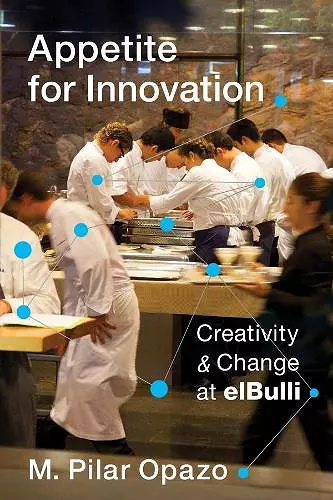Appetite for Innovation
Creativity and Change at elBulli
Format:Paperback
Publisher:Columbia University Press
Published:7th Dec '18
Should be back in stock very soon

The name elBulli is synonymous with creativity and innovation. Located in Catalonia, Spain, the three-star Michelin restaurant led the world to "molecular" or "techno-emotional" cooking and made creations, such as pine-nut marshmallows, rose-scented mozzarella, liquid olives, and melon caviar, into sensational reality. People traveled from all over the world—if they could secure a reservation during its six months of operation—to experience the wonder that chef Ferran Adrià and his team concocted in their test kitchen, never offering the same dish twice. Yet elBulli's business model proved unsustainable. The restaurant converted to a foundation in 2011, and is working hard on its next revolution. Will elBulli continue to innovate? What must an organization do to create something new?
Appetite for Innovation is an organizational analysis of elBulli and the nature of innovation. Pilar Opazo joined elBulli's inner circle as the restaurant transitioned from a for-profit business to its new organizational model. In this book, she compares this moment to the culture of change that first made elBulli famous, and then describes the novel forms of communication, idea mobilization, and embeddedness that continue to encourage the staff to focus and invent as a whole. She finds that the successful strategies employed by elBulli are similar to those required for innovation in art, music, business, and technology, proving the value of the elBulli model across organizations and industries.
Appetite for Innovation offers a backstage view of one of the world's most interesting restaurants, its remarkable laboratory, and the foundation that was created after Ferran Adrià made the unusual decision to close his hugely successful restaurant. M. Pilar Opazo was afforded unusually close access, and her insider account is rich and intriguing. The processual view of innovation is useful, as it highlights the many elements that are needed to be galvanized in support of an expansive vision. -- Walter W. Powell, Stanford University
Opazo gives us the inside story of elBulli, a restaurant whose climb to global influence mirrors the culture of today's innovation economy, and its charismatic chef Ferran Adrià, whose passion for creating a new cuisine is driven as much by science as by art. This book will fascinate all kinds of innovators and entrepreneurs—and those who want to understand how a creative organization works. -- Sharon Zukin, author of Naked City: The Death and Life of Authentic Urban Places
Itself an exemplar of creativity and innovation, Appetite for Innovation opens elBulli to reveal the systematic structures and practices that brought world renown to a small restaurant in the mountains of Spain. A beautifully written, analytically sharp ethnography, Opazo's book is a must-read for organizations of all kinds, scholars, chefs, entrepreneurs, culture specialists, and foodies everywhere. -- Diane Vaughan, Columbia University
The tendency when discussing the success of elBulli has been simply to proclaim the genius of chef Ferran Adrià, but Opazo shows that genius is not enough. To have an impact beyond a narrow coterie requires a disciplined and organized inventory of accomplishments and the ability to win over adherents. She thus reveals the infrastructure of success and the paradoxical relationship between willingness to destroy previous accomplishments and practices to push forward an unstable creativity. -- Paul Freedman, Yale University
Innovation? Creativity? Opazo poses the perennially vexatious question of their relationship. The answers that this illuminating study suggests bear both on the sociology of organizations and the organization of creativity. In an ethnographic investigation of Ferran Adriá's celebrated restaurant, Opazo brings to bear the sociologist's attention to social structure, the historian's understanding of archives, and the journalist's feel for the striking detail. Appetite for Innovation is as great a pleasure to read as it is profitable to contemplate. -- Priscilla Parkhurst Ferguson, Columbia University
Working at the creative intersection of organizational sociology, and sociology of knowledge and culture, Opazo provides a sharp framing of the routinization of innovation and charisma at elBulli, the highest ranked restaurant in the over-heated world of haute cuisine. In the process she pushes the ethnography of the commercial kitchen towards the study of scientific laboratories and art worlds, investigating their epistemic practices, organizational innovations and creative rhetorics. Appetite for Innovation is a terrific book to study and teach organizational innovation and field transformation. -- Krishnendu Ray, New York University, president of the Association for the Study of Food and Society, and author of The Ethnic Restaurateur
Opazo has written a fascinating organizational and business analysis of the restaurant and, in the process, produced an insightful account of how a culture of innovation can be achieved and sustained. * Forbes.com *
Opazo examines elBulli with a sharp sociological eye, creating a detailed case study in what she calls the 'production of innovation.' -- Theodore Kinni * strategy+business *
Opazo's investigation will engage anyone interested in the intersection of business, creativity and organizational behaviour. -- Sarah Murdoch * The Toronto Star *
Appetite for Innovation is a well-written, organizational study about the factory of innovation that elBulli was and the foundation it became; certainly a fascinating read for academics, innovators, and chefs alike. * Food, Culture, and Society *
Lays bare the creative process in more detail than almost anything I've read and enriches the debate about where true creativity comes from. -- Brayden King * Contemporary Sociology *
- Commended for PROSE Award in Business, Finance, and Management 2017
ISBN: 9780231176798
Dimensions: unknown
Weight: unknown
336 pages